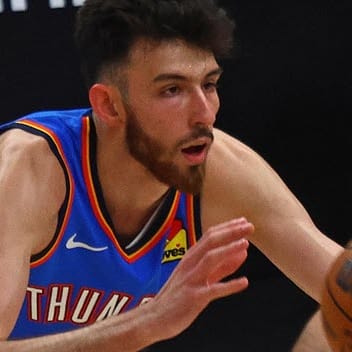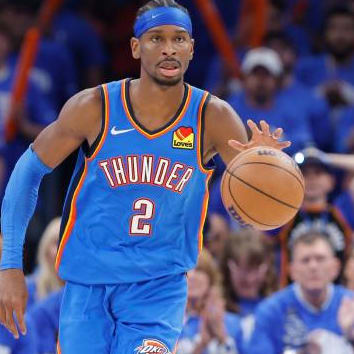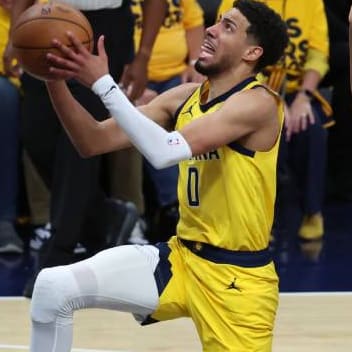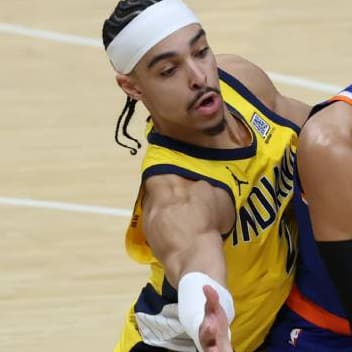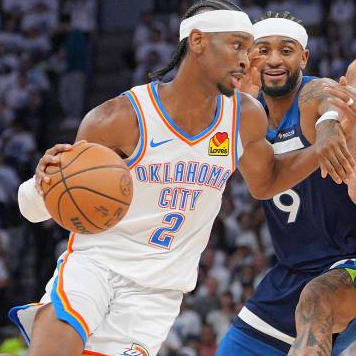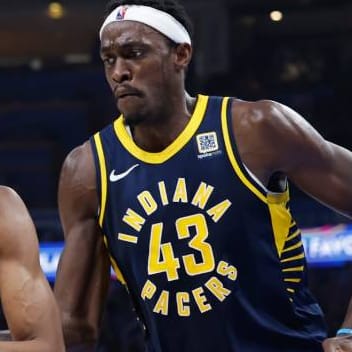This article is part of our The Prospect Post series.
This is Part 2 in a series of articles looking at the fantasy value of players in the 2014 NBA Draft. Each post in this series will focus on a different rookie. Click here for the introduction to the series, and for the breakdown of the first player: Andrew Wiggins.
Rookies have the potential to be great but also the potential to bust. To better help you value these players in fantasy drafts I've developed reasonable best, average, and worst-case scenarios for each rookie based on comparable players who either had similar college careers (thanks to the work provided by Hickory-High), or who are generally given in the media as comparisons for each rookie (e.g. Wiggins is often compared to Paul George).
This way, if you think Andrew Wiggins is the next Paul George, you can use this analysis to help you know what that comparison will mean in terms of a projection of fantasy stats, as well as an idea of where those stats would rank in a standard 10-team rotisserie league. Then, when fantasy draft day rolls around, you will know exactly where you want to target these rookies based on your opinion of how their rookie season will turn out.
In this post, I'll take a look at the second overall pick, Jabari Parker.
Jabari Parker - Milwaukee Bucks (No. 2 Pick)
Player Comparisions Considered:(Draft Year & Pick, Similiarity Score)
Paul Pierce (1998 - 10, N/A), Glenn Robinson (1994 - 1, N/A), Kevin Durant (2007 - 2, 867), Michael Beasley (2008 - 2, 881), Charlie Villanueva (2005 - 7, 844), Josh Childress (2004 - 6, 813), Carmelo Anthony (2003 - 3, 905), Chris Bosh (2003 - 4, 872), Rudy Gay (2006 - 8, 857), Luol Deng (2004 - 7, 880), Al Thornton (2007 - 14, 881), Marvin Williams (2005 - 2, 826), Derrick Williams (2011 - 2, 877), Antoine Walker (1996 - 6, N/A), Anthony Bennett (2013 - 1, 888), Kris Humphries (2004 - 14, 901)
Parker was widely considered the "safest" pick coming into the draft, as well as one of the most prepared to make an immediate impact on the league, likely two of the reasons that the Bucks choose to use the second pick in this year's draft on him. Both of those are characteristics that should also make Paker valuable to fantasy owners. The first step in understanding how valuable he can be is to get a sense of the level of playing time he will get with the Bucks.
Minutes Per Game
The 16 players included in Paker's comparison have experienced a wide range of career success, ranging from future Hall of Famers (Paul Pierce, Kevin Durant) to players that have washed out of the league (Al Thornton), but there is one thing that all of these players have in common: none of them had a rookie season that would have ranked in last season's fantasy top 100 if it were adjusted to an average of 25 minutes per game. In fact, if these stat lines were all adjusted up to an average of 30 minutes per game, only Paul Pierce's rookie season would have ranked in the top 75. On the other hand, if Pierce's same rookie season were adjusted to an average of 38 minutes per game, he would have ranked as the 15th best fantasy player that year.
Think about that, at 25 minutes per game, Pierce's rookie season represents a late-round pick in fantasy drafts. The same stats adjusted to 38 minutes per game is worth a second round pick. The good news for Parker's fantasy value is that there is precedent for players of his caliber to play big minutes in their rookie seasons.
Here are the minutes-per-game averages for the players included in Parker's player comparisons, that were also top-five draft picks:
Player | Age | Year - Pk | Tm | MPG |
Glenn Robinson | 22 | 1994-1 | MIL | 37.0 |
Carmelo Anthony | 19 | 2003 - 3 | DEN | 36.5 |
Kevin Durant | 19 | 2007 - 2 | SEA | 34.6 |
Chris Bosh | 19 | 2003 - 4 | TOR | 33.5 |
Michael Beasley | 20 | 2008 - 2 | MIA | 24.8 |
Marvin Williams | 19 | 2005 - 2 | ATL | 24.7 |
Derrick Williams | 20 | 2011 - 2 | MIN | 21.5 |
Anthony Bennett | 20 | 2013 - 1 | CLE | 12.8 |
Within this group there is a clear delineation. The top four players, who have each had a successful NBA career, played at least 33 minutes per game as a rookie. The other four, who have all struggled in the NBA, each played less than 25 minutes per game as a rookie. Considering Parker's perceived talent level, and Milwaukee's lack thereof, it seems reasonable to expect Parker's playing time to be in line with the first group. As a result, I've projected him to average 35 minutes per game in all of the scenarios considered below. He is simply too good not to play big minutes on a Bucks team that struggled so badly last season.
Now, let's take a look at Parker's best, average, and worst-case scenarios for next season. Keep in mind that these are meant to be reasonable, attainable scenarios.
Best-Case Scenario: Glenn Robinson (Draft: 1994 - 1, Similarity Score: N/A)
Most Bucks fans probably think (hope) that Robinson represents the floor for Parker as opposed to the ceiling, and as a real-life NBA player, they might be right. However, from a statistical perspective Robinson was a superior player in college. Here is a comparison of their per minute college stats (courtesy of sports-reference):
Per 40 | MIN | FGA | FG% | FTA | FT% | 3PM | REB | AST | STL | BLK | PTS |
Glenn Robinson | 35.1 | 23.3 | 48% | 6.7 | 77% | 2.0 | 11.1 | 2.1 | 2.1 | 1.2 | 31.4 |
Jabari Parker | 30.7 | 18.8 | 47% | 8.1 | 75% | 1.4 | 11.4 | 1.5 | 1.4 | 1.6 | 25.3 |
Parker had a slight edge in block rate (1.6 bpg vs. 1.2 bpg), but in every other category, Robinson matched him or out produced him, particularly in scoring (31.4 ppg vs. 25.3 ppg). Still, the two stat lines are similar, which indicates Robinson's rookie season represents a reasonable best-case scenario for Parker's rookie season. Now, let's take a look at Robinson's rookie season in the NBA, adjusted for Milwaukee's pace of play, and adjusted to an average of 35 minutes per game:
Player | MIN | FGA | FG% | FTA | FT% | 3PM | REB | AST | STL | BLK | PTS | Auction Value | Fantasy Rank |
Glenn Robinson | 35.0 | 16.5 | 45% | 5.8 | 80% | 1.0 | 6.0 | 2.3 | 1.3 | 0.3 | 20.5 | $16 | 52 |
If Parker is able to duplicate Robinson's per-possession production with an average of 35 minutes per game, his rookie season would be worth about $16 in fantasy auctions (roughly a 6th round pick) due predominantly to his elite scoring (20.5 ppg) as well as his positive contributions in the rebounding (6.0 rpg) and steals (1.3 spg) categories.
Average Case Scenario: Carmelo Anthony (Draft: 2003 - 3, Similarity Score: 905)
This comparison will be much more palatable for Bucks fans. Anthony had the highest Hickory-Hick Similarity Score of the all of the players that I compared to Parker (905 out of 1000). Check out how similar the two were in college on a per-possession basis (courtesy of draftexpress):
Per 40, Pace Adj | MIN | FGA | FG% | FTA | FT% | 3PM | REB | AST | STL | BLK | PTS |
Carmelo Anthony | 36.4 | 17.7 | 45% | 7.1 | 71% | 1.6 | 10.4 | 2.3 | 1.6 | 0.9 | 23.1 |
Jabari Parker | 30.7 | 18.8 | 47% | 8.1 | 75% | 1.4 | 11.4 | 1.5 | 1.4 | 1.6 | 25.3 |
Anthony averaged a higher rate of assists than Parker in college (2.3 apg vs. 1.5 apg), ironic considering his reputation as a ball stopper, while Parker produced more blocks (1.6 BPG vs. 0.9 BPG). Otherwise, the college stats of these two players were quite similar on a per-possession basis. Now, let's take a look at Anthony's rookie season, adjusted for the Bucks' pace of play and an average of 35 minutes per game:
Player | MIN | FGA | FG% | FTA | FT% | 3PM | REB | AST | STL | BLK | PTS | Auction Value | Fantasy Rank |
Carmelo Anthony | 35.0 | 16.8 | 43% | 6.0 | 78% | 0.8 | 5.7 | 2.6 | 1.1 | 0.5 | 19.7 | $7 | 74 |
The counting stats for this projection are very similar to the best-case scenario, just slightly less optimistic: points (19.7 ppg vs. 20.5 ppg), rebounds (5.7 rpg vs. 6.0 rpg), assists (2.6 apg vs. 2.3 apg), steals (1.1 spg vs. 1.3 spg), and blocks (0.5 bpg vs. 0.3 bpg). The main reason for the decrease in value from the best-case scenario to this scenario ($16 to $7) is the decline in field goal percentage (43% FG vs. 45% FG). Two percentage points may not seem like much, but when you have a player who is shooting this frequently in a standard rotisserie league, that difference can really affect your team's field goal percentage.
Worst-Case Scenario: Derrick Williams (Draft: 2011 - 2, Similarity Score: 877)
Williams and Parker had different styles of play in college. Williams was considered to be more athletic, while Parker was considered to be more of a polished scorer. You can see from their college stats that Williams shot less often, with a much higher percentage, suggesting that a larger portion of his points came on easy baskets:
Per 40, Pace Adj | MIN | FGA | FG% | FTA | FT% | 3PM | REB | AST | STL | BLK | PTS |
Derrick Williams | 30.0 | 13.6 | 59% | 11.5 | 75% | 1.5 | 10.9 | 1.5 | 1.3 | 0.9 | 25.7 |
Jabari Parker | 30.7 | 18.8 | 47% | 8.1 | 75% | 1.4 | 11.4 | 1.5 | 1.4 | 1.6 | 25.3 |
However these two players put up nearly identical counting stats during college. Let's look at how Williams' rookie season would have ranked last year if it were adjusted for Milwaukee's pace of play and an average of 35 minutes per game.
Player | MIN | FGA | FG% | FTA | FT% | 3PM | REB | AST | STL | BLK | PTS | Auction Value | Fantasy Rank |
Derrick Williams | 35.0 | 12.1 | 41% | 4.7 | 70% | 0.9 | 7.5 | 0.9 | 0.7 | 0.7 | 14.1 | $1 | 146 |
Williams' rookie season was a disappointment. He was unable to translate his efficient scoring percentage from college to the pros, and he struggled to find a position. This stat line would rank outside of the top 130, meaning Parker should not be drafted if you believe his rookie production will mirror Williams' rookie production. Parker faces a similar challenge as there is uncertainty about whether he will be a starting small forward or power forward in the NBA. This scenario should concern fantasy players who are considering making a play for Paker.
My Projection
To develop my own projection for Parker, I employed a statistical technique that basically evaluates where Parker ranked in college among his peers in a single category and then projects him to rank similarly in that category in the NBA. For example, if we look at points per game, Parker had the 6th highest scoring average per possession in college of the 16 players that I compared him with. Therefore, my projection will have him ranked in approximately the same position when compared with that group of players in the NBA. Completing this calculation for all of Parker's fantasy categories gives us the following projection, which again has been adjusted for the Bucks' pace of play and an average of 35 minutes per game.
Player | MIN | FGA | FG% | FTA | FT% | 3PM | REB | AST | STL | BLK | PTS | Auction Value | Fantasy Rank |
Jabari Parker | 35.0 | 13.7 | 44% | 4.2 | 73% | 0.7 | 6.7 | 1.7 | 1.0 | 0.7 | 15.9 | $2 | 99 |
This set of projections is slightly worse than even the average-case scenario I presented for Parker. My calculation is less optimistic that he will be able to score 20 points per game right away in the NBA.
My Recommendation For Draft Day
Even in the worst-case scenario above, Parker was ranked near the top 130, so he should be drafted in every fantasy league next season due to his upside, even if you aren't that high on him. If you play in a rotisserie league, you should be concerned with his shooting percentages, because he has the potential to be an negative on your team in those categories. However, if he can stay in the 44-to-45 percent range for field goal percentage, he should be a valuable player with a high scoring average, who also helps out with rebounds and averages close to one three-pointer, one steal, and one block per game. Personally, I'm more optimistic on Parker's prospects for next season than my statistical approach suggests. I would recommend paying $7-10 for Parker in redraft leagues next season (roughly a 6th or 7th round pick).
A Word on Pace
I've mentioned adjusting stats to the Bucks' pace of play several times during this article. Last season, the Bucks had the seventh slowest pace of play in the league at 91.8 possessions per game. That level of pace was consistent with coach Larry Drew's other seasons when he was the coach of the Hawks.
Clearly, Larry Drew will no longer impact the pace of play for the Bucks, but new coach Jason Kidd's Nets had a similar, slightly slower pace of play last season at 91.4. The stats for Parker here have been adjusted to Kidd's pace of play. It is possible that Kidd only played at that pace last season because of the roster he had. If his Bucks play at a faster pace, that should help Parker's fantasy value.
Pace is an important consideration for fantasy player. To use Parker as an example, if he would have been drafted one pick later by the 76ers, who had the highest pace last year of 99.2 possessions per game, that would have meant an additional five possessions per game. Those extra possessions would have moved my statistical projection for him from the 99th best fantasy player to the 73rd best fantasy player.
Over the next few weeks, a similar breakdown will be provided for several other rookies. You can check back often for new breakdowns to be posted, or follow me on Twitter for links to the new breakdowns. Up next, Joel Embiid.
If you have thoughts about these projections that you'd like to discuss, or if you'd like me to calculate an alternative scenario, or a ranking for a different type of league, please leave a comment below or contact me on Twitter.
This article is part of RotoWire's free 2014 NBA Draft coverage. If you'd like access to eveything on the site, please feel free to take advantage of a free 10-day trial to the site at rotowire.com/free.







